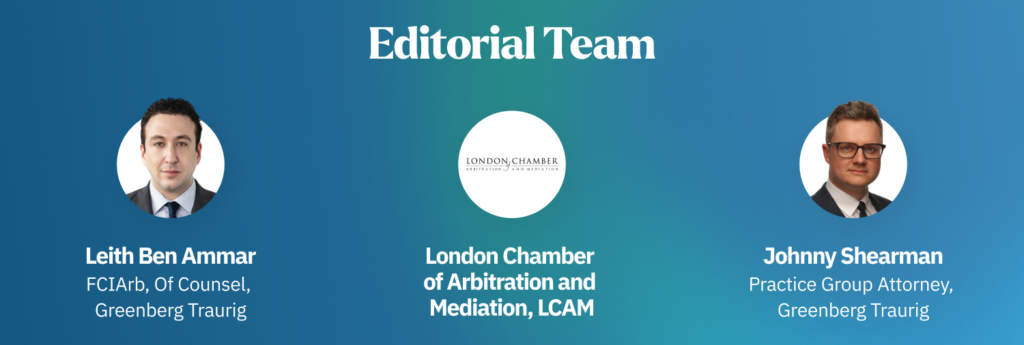THE AUTHORS:
Leith Ben Ammar, Of Counsel at Greenberg Traurig
Johnny Shearman, Group Practice Lawyer at Greenberg Traurig
London Chamber of Arbitration and Mediation, LCAM
The London Chamber of Arbitration and Mediation (LCAM) and Greenberg Traurig London have partnered on a series of articles looking at arbitration and emerging technologies. This easy to digest series provides an introduction to technologies such as smart legal contracts, generative AI, virtual and augmented reality and big data and considers their interplay with international arbitration. In collaboration with LCAM the series is edited by Leith Ben Ammar FCIArb and Johnny Shearman of Greenberg Traurig.
In terms of data storage, the floppy disk was once cutting edge. Now, the technology is obsolete – although, of course, the “floppy” remains part of our consciousness, having been immortalised as the save icon used on the most famous of word processors. That evolutionary cycle took approximately 30 years.
More recently, in the space of just a few years, we have seen an explosion of data and new data sources and we currently find ourselves in the Zettabyte era of data storage – a zettabyte is the equivalent of one billion terabytes. At their very best, a floppy disk could store approximately 240 megabytes of data.
The rapid rise in “big” data is multi-faceted and in part the result of cloud-based computing, video streaming, e-commerce, and the fact that more and more devices can create and store data. In addition, the emergence of new technologies such as crypto-assets and smart legal contracts that utilise distributed ledger technology, virtual and augmented reality, and the move to 5G are likely to ensure that data continues to grow exponentially.
The emergence of big data has not gone unnoticed, and it has prompted a regulatory response. The General Data Protection Regulation (“GDPR”) operating across the European Union (and which remains part of the UK regulatory landscape by virtue of the Data Protection Act 2018) and the Personal Information Protection and Electronic Documents Act in Canada both regulate the use of personal and other types of data.
Data governance has gone from the obscure to a fundamental consideration for all organisations globally, and international arbitration practitioners are not immune. In September 2022, a joint taskforce between the International Council for Commercial Arbitration (ICCA) and the International Bar Association (IBA) issued its Roadmap to Data Protection in International Arbitration.
Parties to an international arbitration, their lawyers, the tribunal members, and the arbitral institution all have numerous data protection obligations, which may compete and overlap. This can create a complex compliance framework, especially in data-heavy disputes involving international parties such as those involving large-scale construction, technology, and infrastructure projects.
It can be argued that the confidential nature of arbitration provides a false sense of security when it comes to data. The ICCA and IBA’s roadmap provides useful guidance in this context.
Those observing the provisions set out in the roadmap need to consider at the outset of an arbitration:
- all the potential flows of, and other activities involving the processing of personal data,
- the data protection rules applicable to such flows and activities,
- the person(s) responsible for compliance with those rules, and
- how to comply with those rules in an efficient and cost-effective manner, with minimum disruption to the arbitral process.
However, as is often the case, adhering to “best practice” can be challenging, and this is applicable in the area of data governance as well. Arguably, this is because it doesn’t fit neatly into one department’s remit. It requires collective and unified thought from the information technologists, legal teams, and the c-suite. Those that do manage to control the flow and use of their data stand to gain. The latest iterations of artificial intelligence are unlocking big data in a way that is accessible through simple, natural language models. Processes such as the disclosure of documents in an arbitration may prove to be more efficient as a result, but, and perhaps more significantly, an organisation’s data has become a valuable asset that can be readily mined like a natural resource, emphasising the need for appropriate control and protection.
ABOUT THE AUTHORS:
Leith Ben Ammar FCIArb is Of Counsel and Co-Chair of Greenberg Traurig’s London office Ability Network. His practice focuses on complex, high value and sensitive international dispute resolution. Leith is a qualified arbitrator and Fellow of the Chartered Institute of Arbitrators. As counsel, he represents clients from Europe, Africa, Asia, America and the Middle East across multiple sectors. He has particular experience in disputes involving very large and technologically complex infrastructure, energy and real estate projects in emerging markets. Leith also has in-depth knowledge of legal issues involving international arbitration and emerging technology. He is the Co-Chair of ENERAP’s UK Chapter, a former supporting expert at the University of Oxford’s Entrepreneurship Centre and an alumnus of its Blockchain Strategy Programme.
Johnny Shearman is a Group Practice Lawyer at Greenberg Traurig LLP. Johnny is dispute resolution lawyer and has gained significant experience in handling a broad spectrum of domestic and international disputes. His legal knowledge encompasses complex contractual and tortious disputes, civil fraud and asset recovery, banking and professional negligence litigation and contentious insolvency matters. His experience includes disputes at all levels from County Court to Supreme Court proceedings, as well as international arbitration.
London Chamber of Arbitration and Mediation, LCAM, is part of the London Chamber of Commerce and Industry (“LCCI”) but independent in its administration of disputes. LCAM was launched to provide innovative, speedy, and cost effective services to help resolve commercial disputes. LCAM offers arbitration, expedited arbitration, and mediation services delivered by a diverse panel with many years’ experience in alternative dispute resolution. LCAM’s Model Mediation Procedure provides a framework for an effective and confidential mediation process. Oversight is provided by the LCAM Advisory Board. Fees are fixed, providing cost-certainty and good value without compromising quality.

The views and opinions expressed in articles posted on Daily Jus are those of the authors and do not reflect the official policy or position of Daily Jus.





